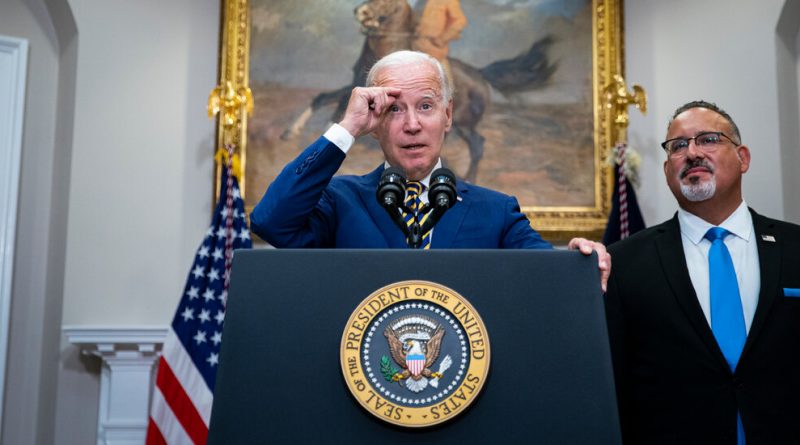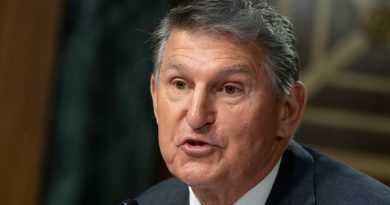Biden Gave In to Pressure on Student Debt Relief After Months of Doubt
At the White House and aboard Air Force One, advocates of debt cancellation made a sustained push to win over the president, who feared the plan would be seen as a giveaway to the privileged.
Send any friend a story
As a subscriber, you have 10 gift articles to give each month. Anyone can read what you share.
By Michael D. Shear, Jim Tankersley and Zolan Kanno-Youngs
WASHINGTON — President Biden and Senator Chuck Schumer of New York, the majority leader, boarded Air Force One on May 17 in Buffalo after visiting with the families of 10 people gunned down in a supermarket. The emotions from the mass shooting were raw, but Mr. Schumer had something else on his mind, too.
Sitting alone with the president in his private cabin, the Senate’s top Democrat spent much of the 58-minute flight back to Washington urging Mr. Biden to wipe away hundreds of billions of dollars in student debt owed to the federal government. It was a promise the president had made as a candidate, Mr. Schumer argued, and it would help millions of low- and middle-income Americans.
Mr. Biden would prove to be a hard sell.
The president had been agonizing for months about the decision. At a CNN town hall a month after taking office, he had flatly rejected forgiving $50,000 in student debt like Mr. Schumer wanted, saying it was too costly and could be seen as unfair to those who paid off their loans. “I will not make that happen,” he said. He even seemed unconvinced that debt cancellation was a good idea at all, suggesting it might benefit “people who have gone to Harvard and Yale and Penn.”
During the flight in May, Mr. Schumer persisted, according to an account of the discussion he provided this week.
Over lunch, he appealed to the president’s emotions, describing a young woman who had approached him with tears in her eyes, saying the crushing burden of her loan payments made it difficult to live. The senator also sought to soothe the president’s fear that erasing some debt would be a boon for rich white students, telling him that “the vast majority are poor people and people of color.”
On Wednesday, Mr. Biden agreed, announcing that he would wipe out significant amounts of student debt for tens of millions of Americans. With less than three months until midterm elections that will determine who controls Congress, Mr. Biden bowed to months of lobbying and overcame his own deep reservations, and those of aides, about the policy and the political implications of an enormous exercise of presidential power.
Key to convincing the president, aides said: making sure debt relief would target much of the money to lower-income and minority students.
He signed off on a plan that went further than even some of his closest aides had expected — canceling $10,000 in debt for those earning less than $125,000 per year and $20,000 for those with Pell grants for low-income students. His plan also reduces payments for all federal student borrowers for years to come.
“Some think it’s too much,” Mr. Biden said when he announced his decision, noting the outrage from Republicans and some Democrats. “Some think it’s too little. But I believe my plan is responsible and fair. It focuses the benefit on middle-class and working families, it helps both current and future borrowers, and it will fix a badly broken system.”
The Biden Presidency
With midterm elections looming, here’s where President Biden stands.
The long-delayed move has drawn fierce criticism from Republicans, who describe it as a costly giveaway to many who do not deserve it, including families making as much as $250,000 a year. It has also ignited an intense debate about the economic consequences, with Lawrence H. Summers, the Treasury secretary under President Bill Clinton, warning that it will “contribute to inflation,” and Jason Furman, an Obama economic adviser, calling it a “reckless” idea that will add a “half-trillion dollars of gasoline on the inflationary fire that is already burning.”
The White House and some outside economists, including analysts from Goldman Sachs, say the debt relief will have almost no effect on inflation because it will coincide with the resumption of loan payments for all borrowers, after a nearly three-year pause for the pandemic.
Mr. Biden’s deliberations on the student loan issue underscored his reluctance to fully embrace the progressive agenda of his Democratic rivals during the 2020 presidential primaries. But they also revealed his willingness to change his mind and his desire to be seen as an advocate of the middle class.
As he finished making the announcement on Wednesday, Mr. Biden was asked by a reporter whether it was fair to those who had already paid back their student loans.
“Is it fair to people who in fact do not own a multibillion-dollar business if they see one of these guys give them all a tax break?” Mr. Biden snapped back, referring to Republican tax cuts in 2017. “Is that fair?”
The Naysayers
Janet L. Yellen, the Treasury secretary and former Federal Reserve chair, was one of the chief skeptics among Mr. Biden’s inner circle of top advisers.
She, like others, worried that the economic effects of a giant giveaway could be profound, especially as the Federal Reserve struggled to keep inflation at bay, according to several officials. Her message was echoed by top Democratic economists, who peppered the White House with concerns about the potential effects.
Mr. Biden began hearing concerns from some of his economic advisers as early the spring of 2021. What had been seen by some as an urgent item was delayed again and again as Mr. Biden mulled the options.
On Dec. 15, the White House hosted a call with advocates of student loan forgiveness, but delivered a message the activists did not want to hear: The president had still not decided to cancel any student debt. In fact, because the economy was rebounding, borrowers needed to prepare for the end of the moratorium on payments, which had been extended regularly since the pandemic began.
In senior staff meetings this spring, as Mr. Biden continued deliberating, advisers offered different takes. Ron Klain, the White House chief of staff, argued that student loan cancellation could galvanize the support of younger voters, many of whom had grown frustrated with the administration.
Source: Read Full Article






